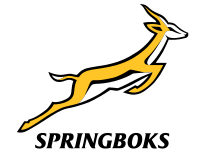 | ||||
| Nicknames | Springboks Springbokke Bokke Amabhokobhoko Bokmasjien | |||
|---|---|---|---|---|
| Emblem | Springbok | |||
| Union | SA Rugby | |||
| Head coach | Rassie Erasmus | |||
| Captain | Siya Kolisi | |||
| Most caps | Eben Etzebeth (131) | |||
| Top scorer | Percy Montgomery (893) | |||
| Top try scorer | Bryan Habana (67) | |||
| Home stadium | Various | |||
| ||||
| World Rugby ranking | ||||
| Current | 1 (as of 09 November 2024) | |||
| Highest | 1 (2007–2008; 2009, 2019–2021, 2022, 2023–2024) | |||
| Lowest | 7 (2017; 2018) | |||
| First international | ||||
(Cape Town, South Africa; 30 July 1891) | ||||
| Biggest win | ||||
(East London, South Africa; 11 June 2005) | ||||
| Biggest defeat | ||||
(Auckland, New Zealand; 16 September 2017) | ||||
| World Cup | ||||
| Appearances | 8 (First in 1995) | |||
| Best result | Champions (1995, 2007, 2019, 2023) | |||
| Tri Nations/Rugby Championship | ||||
| Appearances | 27 | |||
| Best result | Champions (1998, 2004, 2009, 2019, 2024) | |||
| Website | springboks | |||
The South Africa national rugby union team, commonly known as the Springboks (colloquially the Boks, Bokke or Amabhokobhoko),[1] is the country's national team governed by the South African Rugby Union. The Springboks play in green and gold jerseys with white shorts, and their emblem is the Springbok, a native antelope and the national animal of South Africa. The team has represented South African Rugby Union in international rugby union since 30 July 1891, when they played their first test match against a British Isles touring team. Currently, the Springboks are the reigning World Champions, having won the World Cup a record four times (1995, 2007, 2019 and 2023). South Africa are the only team to have won half of the Rugby World Cups they have participated in, and are also the second nation to win the World Cup consecutively (2019 and 2023).
The team made its World Cup debut in 1995, when the newly democratic South Africa hosted the tournament. Although South Africa was instrumental in creating the Rugby World Cup competition, the Springboks could not compete in the first two World Cups in 1987 and 1991 due to international anti-apartheid sporting boycotts. The Springboks' victory over the All Blacks 15–12 in the 1995 final is remembered as one of the greatest moments in South Africa's sporting history, and a watershed moment in the post-apartheid nation-building process. This cast a new light on South Africa, where people of all colour united as one nation to watch their team play.
South Africa regained the world champions title 12 years later by defeating England 15–6 in the 2007 final. Following their 2007 World Cup victory, the Springboks ascended to first place in the IRB World Rankings, a position they held until July of the following year when New Zealand reclaimed the top spot. The team was named 2008 World Team of the Year at the Laureus World Sports Awards.[2] South Africa then won their third World Cup title, defeating England 32–12 in the 2019 final, and were named 2020 World Team of the Year at the Laureus World Sports Awards for the second time. They retained their world champions title in 2023.
The Springboks also compete in the annual Rugby Championship (formerly the Tri-Nations), along with their Southern Hemisphere counterparts Argentina, Australia and New Zealand. They have won the Championship five times in 27 competitions and are the only team to have won a version of the competition and the Rugby World Cup in the same year.
Rugby union is a highly popular sport in South Africa, often attracting the country's most talented athletes. For nearly a century, South Africans have rallied behind the Springboks, the team's success has transcended the sport, becoming a symbol of national pride recognized even by those who don't follow rugby.
Sixteen former Springboks and influential South Africans have been inducted into the World Rugby Hall of Fame.
Many teams have suffered their biggest record defeats to the Springboks, including Australia, Italy, Scotland, Uruguay, Wales and New Zealand.
- ^ "Amabokoboko Back at No.1". Rugby365. 3 November 2019. Retrieved 7 November 2019.
- ^ "Winners archive – South Africa Rugby Team". Archived from the original on 30 November 2009. Retrieved 4 September 2011.